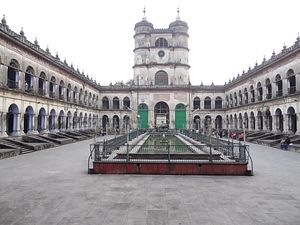The Bharatiya Janata Party (BJP) may have had more support from Muslims during India’s recently concluded election than previously expected. This may come as a surprise to some due to the BJP’s reputation as a Hindu nationalist party and the Muslim community’s wariness towards Prime Minister Narendra Modi given his alleged complicity in sectarian riots in Gujarat in 2002.
Despite these expectations, the data don’t lie. First, the BJP won 71 out of 80 seats in the populous northern state of Uttar Pradesh, where Muslims are over a fifth of the population. This feat would have been mathematically impossible if all of the state’s Muslims voted for non-BJP candidates, even if their votes were split among several parties such as the Bahujan Samaj Party, the Samajwadi Party, and the Congress Party. According to BJP party spokesman Mukhtar Abbas Naqvi, around 14-15 percent of India’s Muslims voted for the BJP. This is a vast improvement over the 2-3 percent garnered in previous elections.
Such a high percentage, while representing the economic aspirations of many Muslims fed up with successive Congress governments, also likely reflect a Shia Muslim surge for the BJP. It is important to remember that the Muslim community in India is not homogeneous, but rather contains numerous schools, sects, and approaches. The most important of these, outside of mainstream Sunni Islam, is India’s Shia community. By many estimates, India has the second largest Shi’a population in the world, after Iran. Nonetheless, Sunnis make up the vast majority of India’s 180 million Muslims and tend to dominate India’s Muslim discourse and institutions, often to the chagrin of Shias. For example, in 2005, Shias broke away from the Sunni dominated All India Personal Law Board, a non-governmental association of Muslims that advises the government on Islamic personal law, because they felt that Sunni interpretations of family law dominated over Shia ones.
These kinds of domestic disputes, combined with rising Sunni-Shia tensions across the Muslim world, has increasingly polarized India’s two largest Muslim communities, something that is reflected in their respective voting patterns. A Shia leader in Varanasi, Uttar Pradesh, the city which elected Narendra Modi to Parliament, stated that “traditionally, Shias don’t go where Sunnis go…politically we have seldom been together. So when we saw Sunnis opposing Modi, we decided to back him.” Shias in Varanasi allege that Sunnis opposed the Shia Ta’ziya procession and created a land dispute over an Imambara (hall for the remembrance of Shia Imams). Furthermore, they claim only the BJP supported them in this dispute.
Lucknow, the capital of Uttar Pradesh and a bastion of Shia Islam in India, has been an especially fertile city for pro-BJP sentiment among Shia Muslims. Lucknow has a long history of major Sunni-Shia riots, made worse in the past two decades due to the incitement of Sunni scholars in the city aided by the spread of fundamentalism from neighboring Pakistan; Pakistan and India both share the Deobandi movement, a radical interpretation of Sunni Islam similar to Salafism (Wahhabism). This development has made Shia leaders anxious. Lucknow’s Shia leader Maulana Kalbe Jawad all but endorsed the BJP candidate from the city, Rajnath Singh (who won), praising him and comparing him to former BJP Prime Minister Atal Bihari Vajpayee, who also represented Lucknow during his time in the Lok Sabha.
Shia alienation from the Sunni-dominated Islamic world has made individual Shias more likely to throw their lot in with the BJP and adopt a more India-centric approach to politics, rather than an approach that focuses on the global Muslim community. The BJP’s most prominent Muslim figure, party Vice President Mukhtar Abbas Naqvi, for example, is a Shia.
Future trends all point to continued increasing support for the BJP from Muslims, driven largely by Shia voters who feel alienated from India’s Sunnis.Being mostly artisans and craftsmen, India’s Shias have a lot to potentially gain by BJP policies that would improve India’s economy, especially sectors such as manufacturing that have been relatively underperforming but are the focus of Narendra Modi’s keen interest.
Akhilesh Pillalamarri is an Editorial Assistant at The Diplomat.

































